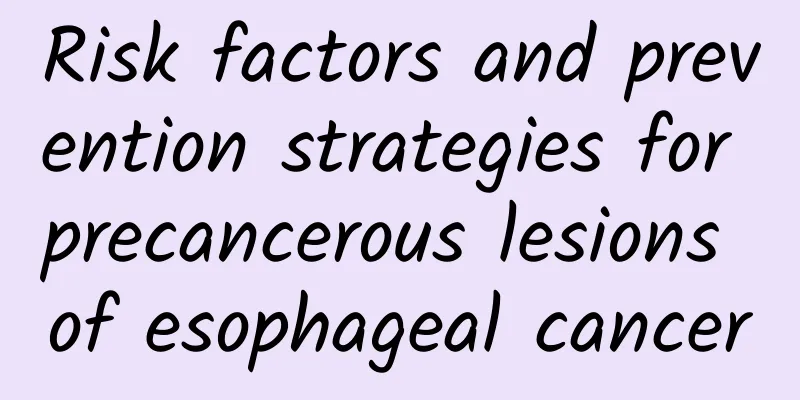Risk factors and prevention strategies for precancerous lesions of esophageal cancer

|
Esophageal cancer is a malignant tumor that seriously endangers human health. Its incidence is often closely related to multiple factors. Precancerous lesions are an important stage in the development of esophageal cancer. Understanding their risk factors and taking effective preventive strategies are of great significance for reducing the incidence of esophageal cancer. 1. Bad eating habits are one of the main risk factors for esophageal precancerous lesions. Bad eating habits such as pickled food, moldy food, hot food, high-salt diet and fast eating may increase the risk of esophageal cancer. In addition, the study also found that the quality of drinking water may also affect the incidence of esophageal cancer and precancerous lesions. Therefore, improving eating habits and ensuring the quality of water sources are important measures to prevent esophageal cancer. 2. Genetic factors play an important role in the occurrence of esophageal cancer. Esophageal cancer has a certain family clustering. Individuals with first-degree relatives suffering from esophageal cancer have a significantly increased risk of esophageal cancer. Genetic factors play an important role in the occurrence and development of esophageal cancer. Different genetic susceptibility loci have different effects on the risk of esophageal cancer. Therefore, for people with a family history of esophageal cancer, more attention should be paid to the prevention of esophageal cancer. 3. Bad living habits are also one of the risk factors for esophageal precancerous lesions. Smoking and drinking are risk factors for esophageal cancer. Long-term smoking and heavy drinking will increase the risk of esophageal cancer. Therefore, quitting smoking and limiting alcohol consumption are important measures to prevent esophageal cancer. In response to the above risk factors, we can adopt a series of prevention strategies to reduce the risk of esophageal cancer. First, improve eating habits, reduce the intake of pickled, moldy, high-salt and other foods, and avoid overheating and eating too fast. Secondly, increasing the intake of fresh vegetables, fruits, dietary fiber and dietary calcium can help reduce the risk of esophageal cancer. In addition, people with a family history of esophageal cancer or bad living habits should undergo regular esophageal cancer screening to detect and treat precancerous lesions as early as possible. In short, there are many risk factors for esophageal precancerous lesions, and we should adopt effective prevention strategies for these risk factors to reduce the risk of esophageal cancer from the source. |
<<: Follow-up and treatment principles of esophageal precancerous lesions
>>: Endoscopy doctor, talk about your personal experience of bowel preparation
Recommend
Menstrual flow is light and dark brown in color
For women, menstruation is also a "barometer...
Fruit beauty skin care tips
Fruit is a kind of food that we all like very muc...
Exercise scientifically to prevent sports injuries
Scientific and moderate exercise has many benefit...
What should pregnant women do if they catch a cold or fever?
Only when the pregnant woman is healthy and not a...
Do I still need to eat if I don't feel hungry? Why am I not hungry even if I don't eat at night?
We eat three meals a day, morning, noon and night...
Pathological changes of endometrial polyps
Endometrial polyps are very harmful to women'...
The most serious consequence of premature ovarian failure
Important reminder: Different women may experienc...
Symptoms of hypoxia in late pregnancy
All the baby's nutrition comes from the amnio...
What should women do if they have gynecological inflammation and back pain?
Women's health issues have always been a focu...
How to eat mooncakes in a healthy way? Where do Chongqing people go to enjoy the moon? Let's have a "drama"
“Enjoy the Mid-Autumn Festival and look forward t...
Why can some yogurt be stored for half a year, while others can only be stored for a few days?
When you go to the supermarket to buy yogurt, do ...
How long after ovarian minimally invasive surgery can I have sex?
In our lives, many patients need to undergo minim...
What are the methods of maintaining the uterus?
It is said that women are as delicate as flowers....
What to do if you have a sore throat during confinement
After a pregnant woman gives birth, a large amoun...
What should I do if I have frequent and urgent urination in gynecology?
In daily life, women often run to the toilet. Mos...









